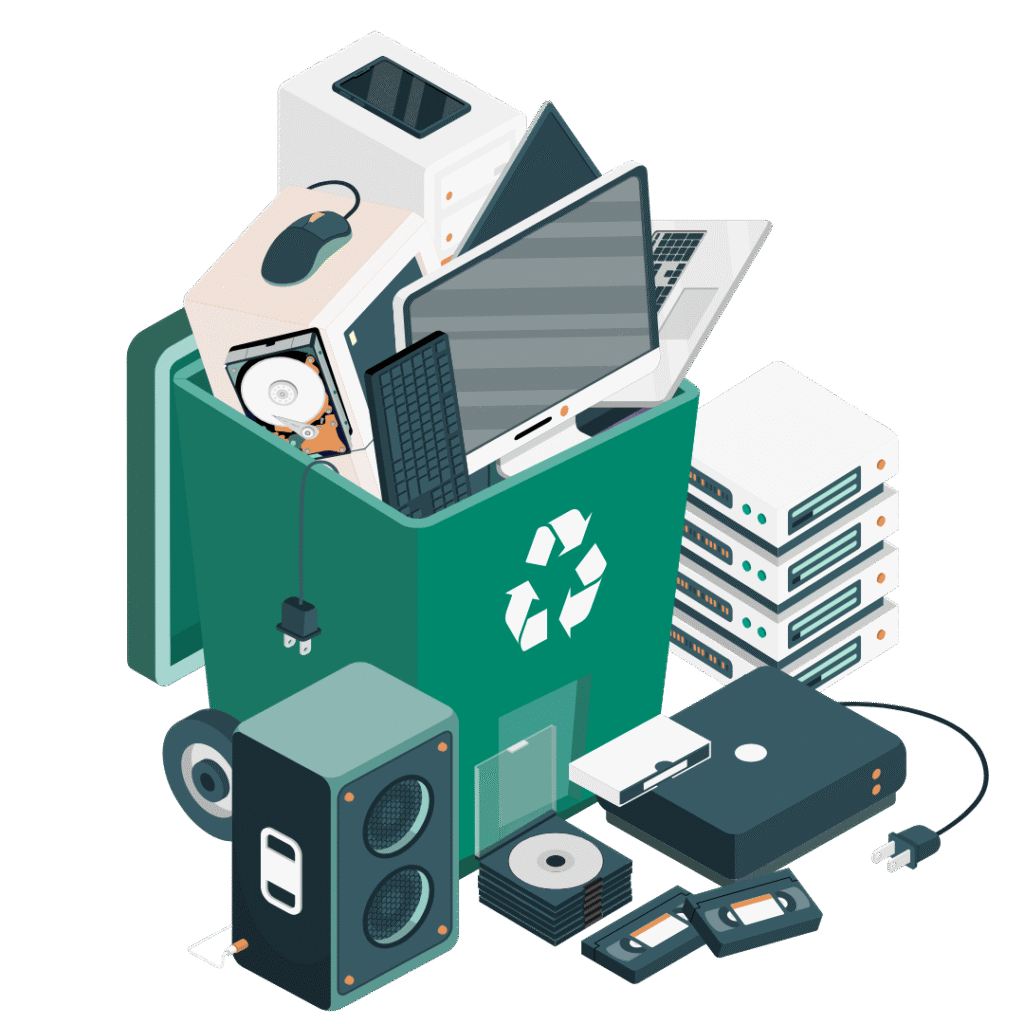Computer and Electronics Recycling Services in the San Francisco Bay Area
Dispose of your old or broken computers with GreenCitizen! We make recycling electronic devices simple and convenient. Contact our Burlingame Eco-Center in the San Francisco Bay Area or use our nationwide mail-in service.
We are open from Monday to Friday, 10 AM to 6 PM.
(Closed on Major Holidays)

Our Services

Recycling Services
for Businesses
Schedule hassle-free electronics recycling pickups for your office, IT room, or data center equipment cleanup.

Drop-Off
Recycling
Enjoy contactless, easy, and affordable drop-off recycling for responsible electronics disposal. Perfect for individuals!

Building-Wide
Pickup
Host a building-wide electronics recycling event—building managers or tenants simply sign up, and we handle the rest.

Solar Panel
Recycling
Drop off solar panels for recycling to help reduce landfill waste. Available for businesses and individuals.

Data
Destruction
Avail our data destruction service that meets DOD 5220.22-M and NIST SP 800-88 standards, ensuring permanent data erasure.

Product
Destruction
Safely destroy proprietary equipment or prototypes with secure oversight. Recycled and certified for assurance.

Styrofoam
Recycling
Recycle Expanded Polystyrene (EPS) Foam #6 with GreenCitizen, where it’s remade into frames, molding, and more.

IT Asset
Disposition (ITAD)
Resell your unwanted IT assets with GreenCitizen to extend their life, reduce e-waste, and share in the profits.

Mail-In Electronics
Recycling
Mail in your electronics for eco-friendly recycling. Available nationwide for residents, businesses, and organizations.
GreenCitizen in Numbers

411,880
Individual Customers
Served
71,799
Business Customers
Served

32,563,956
Pounds of Electronics
Recycled

374,693
Units of Electronics
Responsibly Re-used
1,600,000+
Annual Active
Website Visitors
392
Actionable Blog
Posts Published
983
Environmental News
Published
4,200+
Green Directory
Entries
What Our Customers Say
Thank you Juan, Everything went well and your staff were polite and very efficient.
The pickup went very well. Thank you to everyone who helped coordinate.
Pickup went well. The guys been to the same data center location before which made it easier.
Thank you all for making us a bit greener! It is so hard for labs! Appreciate your service!
Thank you with our recycling needs yesterday. The 2 men who came were very helpful and made the process easy. We appreciate your service.
The pick-ups went great last week. I really appreciate all the work as I know the location is not that simple. Thank you.
It went great! I think this is our 3rd pickup, they have all gone really well. Thanks.
Everything went well, I didn’t even notice it was gone. Your team was quick and efficient. Thanks for helping save the planet!
GreenCitizen on New York Times
Why Recycle Your Old Computers and Electronics?
Recycling your old or broken computers is crucial for both the environment and your business. Electronic equipment, from used computers to outdated technology, contains hazardous materials, like lead, mercury, cadmium, that shouldn’t end up in landfills. By choosing to recycle instead of simply throwing away or discarding your electronics, you help reduce harmful waste and conserve valuable resources.
Many states have enacted electronic waste recycling laws that require manufacturers to offer recycling programs for their products. These laws ensure that consumers have access to convenient recycling options for their used electronics. On the federal level, the Environmental Protection Agency (EPA) oversees the disposal of electronic waste under the Resource Conservation and Recovery Act (RCRA), setting standards for safe and environmentally sound recycling practices.
At GreenCitizen, we make it easy to dispose of electronics responsibly. Whether you need to get rid of outdated equipment or secure data destruction, we provide safe, efficient, and compliant recycling solutions. Don’t throw out or discard your electronic equipment carelessly—opt for a solution that protects both the planet and your company’s data security.
Choose GreenCitizen as your trusted partner in responsible electronic disposal.
Professional Computer Recycling for Businesses
GreenCitizen offers tailored computer recycling solutions for businesses, ensuring your desktop and laptop disposal is efficient, secure, and environmentally responsible. Our proprietary GreenCitizen Total Accountability Management System (GTAMS) tracks major items with a unique asset ID, guaranteeing none of your equipment is illegally dumped overseas. This enables responsible demanufacturing right here in the US, recovering valuable raw materials, and saving energy and costs.
Our convenient business pickup service makes it easy to recycle in bulk, whether you’re upgrading office tech or clearing out old systems. GreenCitizen also provides secure data destruction for hard drives, CDs, DVDs, and more, protecting your sensitive business information from potential risks.
Why Partner with GreenCitizen Recycling?
- Streamlined bulk recycling for electronics, like desktops and laptops
- Certified secure data destruction to protect your sensitive data
- GTAMS proprietary tracking system for total transparency
- Convenient pickup services tailored for businesses
- Simple drop-off solutions for individuals living in the San Francisco Bay Area
- Mail-in recycling services for nationwide users
Join the growing number of businesses and individuals committed to sustainability. Recycle your old computers with GreenCitizen, reduce costs, and keep your company eco-friendly while protecting your data.
Get Started Today!
Ready to get rid of your old computers and electronics? Whether you’re in San Francisco or anywhere in the US, contact us today to learn how to recycle your electronic devices. Together, we can reduce e-waste and keep our community clean!
